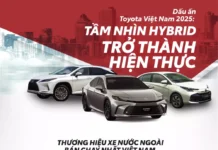In the early hours of April 3, (Vietnam time), US President Donald Trump officially signed an executive order imposing global import taxes.
However, automobiles and auto parts are not subject to these new tariffs as they are already subject to additional taxes under Section 232 of the Trade Expansion Act of 1962. This regulation was previously announced in Proclamation No. 10908 on March 26.
Nonetheless, according to the US Federal Register, import tariffs on automobiles and light trucks entering the US market will still increase significantly to 25% from April 2. Auto parts will be subject to this tariff from May 3. This is a substantial increase, ranging from 10 to 25 times the current preferential rates that the US offers to the European Union (2.5%), Japan (2.5%), and South Korea (0%).
According to experts, the new US tax policy has not yet had a direct impact. Most of the automakers under VAMA mainly serve the domestic market or export within Southeast Asia. Large corporations like Ford and Honda do not export vehicles or parts to the US, while Thaco’s exports are still limited.
However, in the future, this new tax policy could create a domino effect on the global supply chain, of which Vietnam is a part. A significant reduction in imported vehicles into the US may force international automakers to seek new directions, pushing their products into more open markets, including Vietnam.
The competitive pressure from imported vehicles could certainly increase, especially as Vietnam’s import tariffs are gradually decreasing under free trade agreements. According to EVFTA, from January 1, 2025, tariffs on completely built-up cars imported from the EU will decrease from 39%-42.5% to 31.2%. At the same time, similar tariffs for countries in the CPTPP, such as the US, Japan, and the UK, will also be reduced to 35%.
It doesn’t stop there; automotive powerhouse countries like Thailand and Indonesia, facing new tariff barriers in the US, may shift their exports to Vietnam, further intensifying the pressure on domestic enterprises.
It’s not just the automotive industry that is affected; other key export sectors of Vietnam, such as textiles, footwear, furniture, seafood, and electronics, could also face challenges as the US uniformly increases tariffs on goods from Vietnam by up to 46%.
The new tax policy from the US can negatively impact the economy as a whole. With increased input costs, consumers tend to tighten their spending. They will be more hesitant about significant purchases like automobiles, which will undoubtedly affect the sales and growth of the entire industry.
In response to this wave of changes, Prime Minister Pham Minh Chinh has promptly directed relevant ministries and sectors to hold emergency meetings to assess the impact and develop appropriate response plans to maintain economic stability.
TH (Tuoitrethudo)
The Ultimate Guide to Toyota’s April Offer: Unveiling the Surprising Benefits Beyond the 50% Tax Support
Embrace the vibrant summer spirit with Toyota’s sizzling promotions! From now until April 30, 2025, we’re offering incredible deals on our popular models: Vios, Yaris Cross, Veloz Cross, and Avanza Premio. Get ready to hit the road in style and enjoy the ultimate driving experience with Toyota’s trusted vehicles. Upgrade your summer adventures and be part of the Toyota family!













































